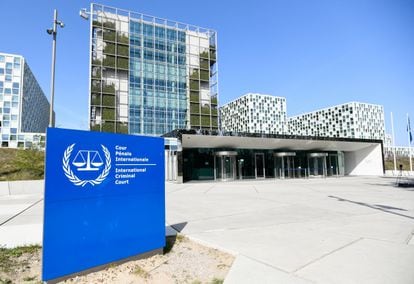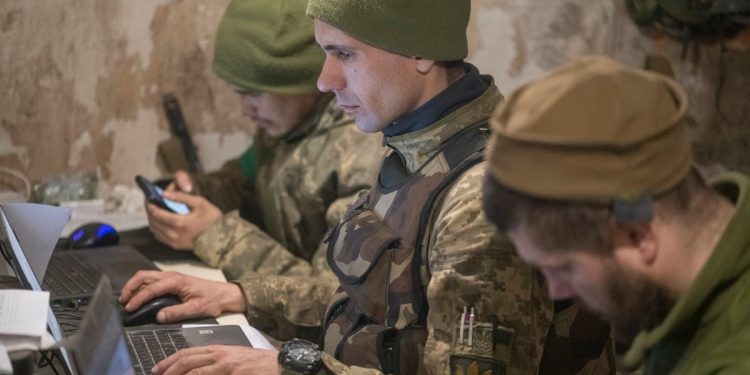Machetes, bullets and bombs are no longer the only means of committing war crimes. Cyber weapons play an increasing role in war conflicts and can cause severe harm to civilians. For this reason, the International Criminal Court (ICC), also known as the International Criminal Court, has proposed investigating so-called cyber war crimes, which are committed by digital means. This was stated this summer by the agency’s chief prosecutor, Karim Khan, in an article published in the magazine Foreign Policy. ICC sources have confirmed to EL PAÍS that they are already investigating the first cases, although they cannot give details of what they are. All eyes are on the war in Ukraine, where Microsoft documented several cyberattacks launched in coordination with conventional military attacks.
“Cyberwar does not develop on an abstract plane. On the contrary, it can have a profound impact on people’s lives,” writes the British jurist. “Attempts to impact critical infrastructure such as medical facilities or power plant control systems can have immediate consequences for many, particularly the most vulnerable. Consequently, as part of its investigations, my office will collect and examine evidence of such conduct,” he states.
What the chief prosecutor says in the article is already the new doctrine of the Court. “The ICC has jurisdiction over genocides, crimes against humanity, war crimes and crimes of aggression.” [de un país a otro], as defined in articles 5 to 8bis of the Rome Statute. If there are operations in cyberspace that fit these types of crimes, then they could be investigated and prosecuted by the ICC,” they assure this newspaper from the chief prosecutor’s office.
Established in 2002 under the Rome Statute, the International Criminal Court is considered an important step forward in upholding international law. The genocides of the former Yugoslavia (1991-1995) and Rwanda (1994), judged by two international criminal courts ad hocaccelerated the need to establish a permanent body to prosecute humanitarian crimes.
The cases examined by the ICC may arise following a complaint from a State that is part of the Court, at the direction of the United Nations Security Council or at the initiative of the chief prosecutor. The Rome Statute has been signed and ratified by 123 States. There are very notable absences: the United States, Russia, China, India or Israel are out. The Court currently has 17 investigations underway, including one opened last year in Ukraine.
The elusive digital arena
One of the complexities of the cyber arena is its opacity. It is very difficult to attribute cyberattacks to authors with first and last names. Aware of this, many armies resort to a range of digital tools (blocking communications, demolishing or infiltrating systems) to accompany conventional war operations. This is what is known as hybrid warfare, which often moves in a gray area located between war and peace, legality and illegality.
Added to this is another problem: what treatment to give to the convicted. “Even in the event that the hackers who have carried out an attack, will they be considered civilian or military personnel? The Geneva Convention applies to military personnel, but not to workers in private organizations linked to governments,” reflects Raquel Jorge, technology policy analyst at the Elcano Royal Institute. “How do you evaluate the difference between intent (taking down IT systems) and impact (taking down a hospital ICU)? The ICC will need the cooperation of companies to evaluate the process and its consequences.”
Khan’s team is collaborating with Microsoft, closely involved in kyiv’s cyber defense, to have the necessary technical means to conduct investigations in cyberspace. “Cyberspace is increasingly used in war contexts and even to commit war crimes. The private sector and governments should support the ICC’s efforts to collect evidence and improve defenses. We appreciate the Court’s initiative in this area and we will continue to support it,” says a spokesperson for the technology giant. The company published a report late last year documenting the coordination of cyberattacks and conventional military operations in Ukraine.
On March 2, 2022, the Microsoft Threat Intelligence Center (Mstic) identifies a group of hackers Russian poking into the systems of the Zaporizhia nuclear power plant. The next day, the Russian army attacks and occupies that critical facility. On March 4, a group of hackers related to the Russian military compromises a computer network in Vinnytsia. Two days later, the city’s airport is hit by eight cruise missiles. On March 11, the computer systems of several public agencies are blocked in Dnipro. Hours later, Russia launches the first attacks against government buildings in that city. Between April 19 and 29, an organized group of hackers unofficially linked to Moscow cripples the systems of a Lviv logistics provider and inspects details of the city’s transport network; On May 3, Russian missiles hit railway substations, causing chaos in transportation services.
“These attacks are not like those of 2017,” reads the Microsoft report in reference to NotPetya, one of the most destructive viruses in history. Initially aimed at Ukrainian companies and public institutions, this cyber weaponhad the appearance of a ransomware (a variety of viruses that encrypt the system and release it in exchange for a reward), but it was soon seen that it did not offer any ransom option: it directly destroyed information. It ended up spreading throughout much of the world, with at least 300,000 computers affected. “While this time Russia has been careful to locate its malware [software malicioso] destructive attack on specific networks located in Ukraine, these attacks are more sophisticated and widespread than many reports acknowledge,” the document states.
Legal fit
Until now, International Law had not taken into account cyberspace as a terrain in which serious crimes could be committed. The ICC’s is a totally new approach. “Any type of computer attack aimed at the destruction of civil infrastructure, such as hospitals or power plants, falls within the concept of war crimes,” indicates Luis Arroyo Zapatero, honorary rector of the University of Castilla-La Mancha and specialist in Law. International Criminal. “There is no need for physical destruction: a hospital can be rendered useless by altering the IT resources. In my opinion, these attacks fall within the concept of war crimes.”
“Although no article of the Treaty of Rome refers to cybercrime, it can potentially meet the conditions that define many international crimes,” writes the Court’s chief prosecutor, citing the International Committee of the Red Cross (ICRC) as one of the organizations that have most denounced the harmful potential of cyberattacks. “The ICRC has reiterated that cyber attacks must comply with the principles of distinction and proportionality and be directed only against military targets,” Khan observes in his article.

Kubo Mačák, professor of international law at the University of Exeter and former legal adviser to the ICRC, was the co-author of one of the studies referred to by the chief prosecutor. Mačák and his colleagues concluded that certain particularly serious cyberattacks launched against medical facilities during armed conflicts could be considered war crimes. “This view is now shared by many legal colleagues. In times of war, international law prohibits direct attacks against civilian targets, without distinction as to the weapon used. Therefore, launch a cyber operationagainst a critical civilian infrastructure could turn its author into a war criminal,” the Slovak reasons. This is also concluded by a report prepared for the United Nations in 2021 by an international group of experts, although it highlights the difficulty that investigators will encounter in attributing alleged crimes triggered by digital means.
Disinformation and hate speech
There is another important novelty in the new ICC doctrine. “We are aware of the misuse of the internet to amplify hate speech and misinformation, which can facilitate or directly lead to atrocities,” Khan argues in his article. “That is not within the criminal types. It is good that the chief prosecutor makes that observation, because he has the initiative to introduce issues. There are cases in which hate speech is used as a weapon of war,” says Arroyo. The International Criminal Court of Rwanda, for example, investigated and convicted the founders of the Radiotelevisión Libre de Las Mil Colinas station for calling for genocide.
What real consequences can a ruling from the International Criminal Court have? “The crimes prosecuted by the ICC are universal crimes. In France they continue to condemn those responsible for crimes in Africa when they set foot on French soil,” Arroyo illustrates. “The solution for those convicted is not to travel outside their country. Vladimir Putin was a notable absence at the last G20 summit in New Delhi. “George W. Bush has not left the United States since he left the White House.”
You can followEL PAÍS Technology in Facebook andTwitter or sign up here to receive ourweekly newsletter.
Subscribe to continue reading
Read without limits








![Inter Miami rescued an agonizing draw in the last play of the match against New York City, with Messi’s second absence [Video] – The NY Journal Inter Miami rescued an agonizing draw in the last play of the match against New York City, with Messi’s second absence [Video] – The NY Journal](https://morningexpress.in/wp-content/uploads/2023/09/GettyImages-1710637884-75x75.jpg)
